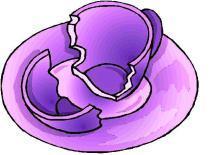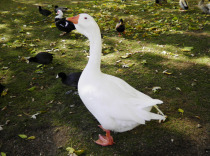Pat Bertram's Blog, page 287
December 6, 2011
Introducing Joylene Nowell Butler, author of "Dead Witness" and "Broken But Not Dead"
[image error]Someone left a comment on my blog the other day, then apologized for intruding where he didn't belong. This worried me. I wondered what I had done to make anyone feel unwelcome. Then it occurred to me that I have made so many friends here that perhaps it seems like a private blog. When you talk about the important things in life (writing, grief, life itself) you connect quickly, even though the commenters might live in such mythical places as Canada, New Zealand, Australia, and Georgia (USA).
Joylene Nowell Butler was one such commenter who has now become a friend. We have never met, might never meet (though I would like to), but the connection is very real. She eased a terrible time in my life with her wisdom and sympathy, with her steadfast presence. I'm ashamed to admit, I am remiss about returning the favor and visiting her blog, A Moment At A Time On Cluculz Lake, though I intend to get over there more frequently. She has insightful posts, wonderful guests, and gorgeous photos of Cluculz Lake in Canada.
Joylene is the author of suspense thrillers Dead Witness and Broken But Not Dead. In honor of our friendship and the publication of her second book, I am gifting her with a mini blog tour.
I am interviewing her today on another of my blogs. Click here to find the interview: Pat Bertram Introduces . . . Joylene Nowell Butler, Author of "Broken but not Dead." I always enjoy hearing (seeing) how other authors view writing and the writing life. Don't you?
Click here to read an excerpt from: "Broken but not Dead" by Joylene Nowell Butler
More than three years ago, I posted an invitation to interview characters, and she was one of the few who took me up on my offer. It impressed the heck out of me! (That was how and where we met.) Here is that interview: Pat Bertram Introduces . . . Valerie McCormick, Hero of "Dead Witness" by Joylene Nowell Butler
Click here to read an excerpt from: "Dead Witness" by Joylene Nowell Butler
Thank you for everything, Joylene. I hope you have a fantastic New Year, filled with hope and peace and many wonders.
Tagged: "Broken but not Dead", Dead Witness, Joylene Nowell Butler, thriller








December 5, 2011
The Awesome and Awesomely Terrible State of Grief
 Whenever I hear that one of my sisters (or brothers) in sorrow is being cajoled into taking drugs to overcome her grief, I want to lash out, and this is how I lash out — I write a blog about it.
Whenever I hear that one of my sisters (or brothers) in sorrow is being cajoled into taking drugs to overcome her grief, I want to lash out, and this is how I lash out — I write a blog about it.
Grief is not a medical disorder. If the bereft has sunk into a severe depression, if she can't sleep, if she is suffering symptoms of Post-Traumatic Stress Syndrome, perhaps pharmacopeia can help. But if the bereft is taking care of herself and her family, if she is connecting to people in a real way (or as real as is possible considering how isolating grief is), if she is not endangering herself or anyone else, then the last thing she needs is to be badgered into solving her problems by taking a pill.
Grief is not a problem to be solved. It is not an abnormality that needs to be corrected. Daily bursts of grief during the first two years are normal. In fact, for many bereft, the second year is worse than the first. The original shock of losing the most significant person in your life and the shock of confronting death on a visceral level do not begin to wane until after the first year. As that protective shroud begins to unwind, the truth is shown in all its stark horror. He is dead, and there is nothing you can do about it. Of course, you knew that, but during the second year, the knowledge seeps into your soul, and you feel the truth of it.
All during my first year of grief, I kept listening for the phone, hoping he would call and tell me I could come home, that he forgave me for whatever it was I did that made him reject me. I do not know where that thought came from. I never did anything (except small inconsideratenesses) for which I needed forgiveness. And he didn't reject me. He died. But somehow, that is the way my mind made sense of the situation.
About fourteen months into my grief, the truth sunk in that he will never call to tell me I can come home. This set off an upsurge of grief that stayed with me for weeks. Now I've regained my equilibrium, but I still have bursts of grief every day. Sometimes they last seconds, sometimes they last minutes, sometimes they last longer. This is normal. Truly. (Not having bursts of grief everyday is normal, too, but that is not the issue here.)
All grief is not the same. I lost my brother and my mother a few years ago. I was sad at their deaths, but felt no great life-altering grief. Then my life mate/soul mate died, and his death caused such a soul quake that I am still reeling from the effects. (Recently, another layer of the shroud has unwound, and I can think more clearly now than I have for many years. I must have been more numb during the last years of his dying than I thought I'd been.)
Grief is not just a state of sadness. Grief is a regulator, rewiring our brains to accept the enormity of life and death. Grief is a prism, focusing our attention on the big picture, forcing us to ask the important questions of why we are here, where we are going, and how we connect with each other and the universe. Grief is a teacher, helping us to grow, to become more than we ever thought possible. (At least I think it does — I am not yet the person I hope to be.) Grief is also a gift, perhaps even a privilege. Not everyone has the opportunity (or the ability) to connect so deeply with another person that the death of that person changes the whole universe.
I make grief sound like a good thing, don't I? And maybe it is. Why do all good things have to be happy things? Given a choice, of course, I'd rather him than having to deal with the pain of his absence, but it's only by feeling the pain and processing it that I can see what it does and how it works. Sometimes I think my whole life has led to this very moment, to this place where I can separate the myriad feelings of grief and translate them, to explain the truth of this awesome and awesomely terrible state.
This normal state.
Tagged: coping with grief. grief is normal, death, grief, grief bursts, life and death, loss








December 4, 2011
Make Every Character Count by Dave Ebright
 Tonight I'm posting an article by an author friend of mine. I don't know where I met him — perhaps here on this blog — but now we're connected at various sites. He's quite a character, this Dave Ebright, and he penned an award-winning pirate story for young adults called Bad Latitude. (Even the title cracks me up.) Dave's second YA novel, Reckless Endeavor is on its way to me right now, probably spending the night in a lonely USPS outpost somewhere. I can hardly wait to read it! Adventure, the haunted town of St Augustine, and dead pirates. What's not to like? Here is what Dave has to say:
Tonight I'm posting an article by an author friend of mine. I don't know where I met him — perhaps here on this blog — but now we're connected at various sites. He's quite a character, this Dave Ebright, and he penned an award-winning pirate story for young adults called Bad Latitude. (Even the title cracks me up.) Dave's second YA novel, Reckless Endeavor is on its way to me right now, probably spending the night in a lonely USPS outpost somewhere. I can hardly wait to read it! Adventure, the haunted town of St Augustine, and dead pirates. What's not to like? Here is what Dave has to say:
I was participating the other night on Pat's forum at GATHER, No Whine, Just Champagne (which is a very worthwhile place to hang out & chat about the craft of writing on Thursday nights at 9PM EST — not a paid commercial message) & made a comment that got me in deep trouble with my friend & our awesome moderator. So here I am, making amends & torturing Pat's readers with … gulp … an opinion. Here's how it all started (unedited):
(ME) "I actually wrote a blog post on a writerly topic about making every character count — then I realized — Who the heck am I to be writing something about writing? — so I deleted it.
(PAT) "Um . . . Dave? What are you talking about? Why shouldn't you write about a writerly topic? If you've seen half the crap out there about writing that I have, you'd understand that you have more right than most. Did you save any of the post about making every character count? If not, can you rewrite it? I'd love to post it on my blog if you don't want to post it on yours.
So, here is my writerly blog post.
_________________________________________________________________________
Make Every Character Count by Dave Ebright:
Google the phrase "Make every word count." Writers & teachers use it repeatedly in articles, on blogs, in classrooms & as part of 'how to' seminars. Great advice but there could be a Part B which should read – make every character count.
Recently, while reading a bestseller's novel, the need for another form of economy in writing all but screamed from the pages. The book contained so many characters it needed an accompanying playbill for reference. It was difficult to follow & by the mid-point, the slog was on. The plot faltered, confusion set in & my interest waned.
I have written two books, both part of a YA series, with another on the way. As most writers discover (& hopefully strive for), the writing improves from one effort to the next. Word economy can be one result, as well as the decision-making. There are twenty-four characters in my first book. Five of them make only minor contributions to the story. The second book has but fifteen & all play vital roles, affecting the action, enhancing the humor or taking center stage for relevant scenes. Limiting the number of characters was intentional, the result of lessons learned, but I was determined that every character would serve a purpose.
Now forget the "writerly" approach, I'm not comfortable with it anyway. Try this.
The characters are part of your book's team. You want to pick the best players to participate. You coach & develop them via edits & rewrites to become interesting, memorable, funny or evil. Since it's your team (book), you decide on who gets the playing (plot) time. Anyone given the privilege to make your team has to contribute or they're benched, or jettisoned to the bilge of a pirate ship. Whew! Now that sounds more like me.
Writing for only four years hardly qualifies me as an expert but as an avid reader who happens to write, character fillers performing busy work are distractions. Sure, make every word count, but take the same approach with your characters.
Okay – I'm gettin' back to doin' what I do best now.
Feel free to chop, edit or delete altogether, Pat - no hard feelings.
I didn't chop, edit or delete a single word. I was right — this writerly discourse by Dave Ebright deserved a better fate than ending up in the rcycle bin. Dave made a good point, one that is often overlooked: make each character count. He made another good point: No Whine, Just Champagne is a great place to hang out on Thursday nights. We've been having some wonderful chats about writing and the writing life. Here is a link to the most recent discussion, the one that inspired this post, Maximum Capacity — No Whine, Just Champagne Writing Discussion #170
Tagged: Bad Latitude, Dave Ebright, dead pirates, make every character count, No Whine Just Champagne, Reckless Endeavor








December 3, 2011
Getting a Grip on Grief
 Today is Saturday, my sadder day. The eighty-eighth one. It's odd that my body remembers this is the day of the week my life mate/soul mate died. Even when I don't remember, I wake up sadder than I normally do. (Whatever it is that remembers, though, can't count. For that, I need a calendar to figure out exactly how many Saturdays he's been gone.)
Today is Saturday, my sadder day. The eighty-eighth one. It's odd that my body remembers this is the day of the week my life mate/soul mate died. Even when I don't remember, I wake up sadder than I normally do. (Whatever it is that remembers, though, can't count. For that, I need a calendar to figure out exactly how many Saturdays he's been gone.)
Despite the lingering sadness and random bursts of grief, I am healing. Today I casually picked up a glass, and it felt solid in my hand. Or perhaps I mean my hand felt solid on the glass. Seems a small thing, doesn't it? But it's a big step that came so quietly, I don't have any idea when I got a grip.
During the first months after he died, I lost my grip, not just figuratively, but literally. Things often slipped through my fingers for no apparent reason. I simply couldn't hold on. It seemed as if when I lost the connection with him, I lost the ability to connect with anything. Or maybe grief sapped all my strength. One night, a mug slipped from my hand. My fingers were crooked through the handle, so I don't know how it happened, but all of a sudden the mug hit the hard tile floor and exploded. Well, actually, the mug shattered, but it sounded like an explosion. It wasn't an expensive mug, nor did I have a particularly sentimental attachment to it — it was one of two give-aways we'd received from the phone company during a local festival — but I wept as if my heart had broken. Or as if he had died again.
Gathering up the shattered pieces and slivers of the mug, I understood for the first time that as the months and years passed, all our things would break or wear out, and every loss would take me one more step away from our life. This had such a profound affect on me, I made sure I had a good grip on anything breakable before I picked it up. Until tonight.
By such small steps, we heal the ragged wounds where our loved ones were ripped from our lives. By such small steps, we move into a life far from the one we once shared. By such small steps, we get a grip on grief.
Tagged: broken cup, can't get a grip, death, getting a grip on grief, grief, loss








December 2, 2011
Is There too Much Promotion on Facebook?
 I got a message from a woman on Facebook the other day asking if I'd be willing to write a post about too much promotion on sites like Facebook. At first, I thought this would be an easy task. I detest all the self-promotion that goes on at the site, especially in the groups.
I got a message from a woman on Facebook the other day asking if I'd be willing to write a post about too much promotion on sites like Facebook. At first, I thought this would be an easy task. I detest all the self-promotion that goes on at the site, especially in the groups.
Some promotion is understandable. Pages, of course, are all about "soft sell" promotion, and so any promotion that goes on there is part of the package. Mostly I use my fan page for announcements, such as kindle sales, and for discussions. (You can find the current discussion here: Do your characters always act at maximum capacity? Should they?)
What people post on their own profile, of course, is up to them. Self-promotion is sometimes the least offensive thing they post on their profiles. How many times can the same dang too-annoyingly-cute-for-words animal video or cloyingly sweet sentimental photo/saying be shared? Sometimes the same thing shows up in the feed day after day after day after day. . . But I digress.
I thought I did a lot of promoting on my profile, in which case I would be the last person to talk about too much promotion on Facebook, but here is a list of the last twelve things I posted on my Facebook profile:
Two posts were about Malcolm's Book Bits and Notions, a great compendium of links to publishing/writing/book news, which everyone in the industry should subscribe to.
Two posts were brags — 1) I just posted my 700th blog post!!! and 2) My blog is ranked 177,350 of all blogs and websites in the United States. People stay an average of 4 minutes. And based on internet averages, ptbertram.wordpress.com is visited more frequently by females who are graduate school educated and browse this site from work. At least according to Alexa.com
Two posts were pithy observations: 1) At the grocery store today, I saw a book written by someone I met here on facebook when they were first starting out. An odd commentary of our times when hitting the grocery store endstacks means hitting the big time. 2) I doubled my memory!! Facebook works faster now. I don't.
One was an announcement for my live chat on gather.com: Maximum Capacity — No Whine, Just Champagne… | Gather (Same discussion as on my facebook page, but with different participants, and different comments and conclusions)
One was an announcement of an article (written by me) that was published in Angie's Diary: Rhythm in Writing | Angie's DIARY
One was an announcement of the Second Wind Publishing Short Story contest: Short Story Contest. No Entry Fee!
The remaining three were links to my blog posts.
Does any of that constitute promotion? In some respects, all of it does, but it's not blatant. At least I don't think it is. Maybe you have a different opinion on the matter.
Nor do I promote in the groups I moderate. I post links to interviews I do with other other authors, I welcome new members to the group, and sometimes I post questions to get people to talk. Mostly what I do as moderator is delete everyone's promotions. The group decided to ban self-promotion except on Saturday because they were sick of it, but apparently everyone assumes that self-promotion is what everyone else does, not what they themselves do. So they continue to post links to their books, links to reviews of their books, requests to "like" their page, and all the other blatantly self-promoting things that we all do on occasion but hate when anyone else does. Instead of just turning everyone loose on Saturday, I've turned Saturday into a self-promotion extravaganza, which has become a lot of fun, and maybe people sell a few books from it, but still, it's promoting to other authors. We need to be promoting to readers, not each other. This is a concept many authors don't seem to get. Nor do they seem to understand that being generous and promoting other authors does not take sales away from themselves. I keep plugging away, though, trying to build a kinder, more giving group, one that is not so deep into self-centered promotion.
So, when the woman asked me to write an aritcle, I thought I knew what to say: that there was too much self-promotion on Facebook. Anything interesting gets buried beneath the constant barrage of "Look at me! Buy my book!" But . . . and here's the sad truth . . . for some people, this constant self-promotion is catapulting them into star status on Amazon. Just because I think there is too much promotion on Facebook, doesn't mean that there is too much from other people's points of view.
Recently I've been reading a lot of articles about promoting on Facebook, looking for the magic ingredient that I seem to be missing. The only thing I can see that I am missing is a willingness to constantly and blatantly plug my books. One guy maxed out five profiles and made a fortune (of course, that fortune came from the money he made off his book telling how to max out your profile, but it was still a fortune.) I was near maximum capacity on my profile once, but didn't want to have to switch solely to a page — I like the interaction on the profile — so I unfriended all the blatant promoters such as the multi-level marketers, the people trying to sell me self-improvement books, people urging me to buy their book that will tell me how to make money on facebook, the people who had maxed out their profiles or were about to, and I was left with about 2,000 friends. I'm trying to make friends with my friends, to see if in the long run that will help sell books. And if it doesn't? I've still gained a lot of online friends.
This has turned out to be a rather lengthy post when in fact all I wanted was to get your opinion. Do you think there is too much promotion on Facebook? What would an acceptable form of promotion be? Do you mind all the promotion? Do you do a bit (or a lot) of promotion yourself? If so, what do you do to promote yourself?
Tagged: blatant self-promotion, Facebook groups, Facebook profile, promotion on Facebook, too much promotion on facebook








December 1, 2011
Short Story Contest. No Entry Fee!
 Now that you've blogged about what you are thankful for and stuffed yourself with Thanksgiving goodies, now that you have finished your NaNoWriMo entry and celebrated your success, now that you have survived your Black Friday shopping and have not yet gotten into the Christmas mood (or have already gotten out of it)…
Now that you've blogged about what you are thankful for and stuffed yourself with Thanksgiving goodies, now that you have finished your NaNoWriMo entry and celebrated your success, now that you have survived your Black Friday shopping and have not yet gotten into the Christmas mood (or have already gotten out of it)…
Think Spring!!
Second Wind Publishing is sponsoring a short story contest. The theme is . . . you guessed it! Spring. Spring and renewal to be exact. Your stories do not have to be light and uplifting (which should be welcome news for all of you writers who pen dark fiction), but they do have to fit the theme. The story should be your own work, no more than 5,000 words, and must not have been published anywhere, not even on your own blog.
There is no entry fee.
The contest is open to anyone in the world, 18 or older, though the entry must be written in English. The deadline is December 31, 2011. The best entries will be posted on the Second Wind Contest Blog for everyone to read and comment.
The winning entry will be published in the upcoming Second Wind anthology, Change is in the Wind. This anthology is a collection of stories by the authors of Second Wind, so the winner will be in good company. (Since I'm a Second Wind author, I will be writing a story for the anthology. Well, I will as soon as I figure out what I want to write.) The winner will also receive a coupon from Smashwords.com for an unlimited number of free downloads of the anthology for one month. The coupon can be sent to as many people as you wish during that month. The winner will also be able to purchase an unlimited number of print copies of the anthology at half price plus shipping costs. And the winner will receive a one year free VIP account from Angie's Diary, the online writing magazine to help you get even more exposure for your writing. ($99.95 value).
So what are you waiting for? Encouragement? Then here it is: you can write a wonderful short story! I know you can! So please send your story as a Word .doc or .docx to secondwindpublishing@gmail.com.
For more information, click here: Second Wind Contest Blog.
Tagged: Anthology, change is in the wind, Second Wind Publishing, short story, short story contest, smashwords, stories of renewal

November 30, 2011
Have You Ever Seen a Goose Do Anything Silly?
 Why is a goose silly? The ancient hieroglyphic for foolish fellow is a goose, so obviously this disparagement of geese goes back to the origins of language. I've met a few geese recently, and I have yet to see one do anything silly. They look arrogant (as you can see from the photo I took today). They seem very goal-oriented (when food is in the offing, they hasten to get their share). And they are a bit intolerant of other species of fowl who might also be after that food. But silly? No. In fact, they are very smart and loyal. They fly in a V-formation, which is the most efficient way to travel. The lead geese do the hard work, breaking wind resistance so the geese trailing behind get a bit of rest, and they rotate positions, so none get too tired or too lazy. They also mate for life, which is more than you can say for a lot of humans. So why silly as a goose? Why not silly as a seal? Or silly as a dolphin? Or silly as an otter? All of those creatures are subject to antics, though of course, that might be our human perspective rather than the truth.
Why is a goose silly? The ancient hieroglyphic for foolish fellow is a goose, so obviously this disparagement of geese goes back to the origins of language. I've met a few geese recently, and I have yet to see one do anything silly. They look arrogant (as you can see from the photo I took today). They seem very goal-oriented (when food is in the offing, they hasten to get their share). And they are a bit intolerant of other species of fowl who might also be after that food. But silly? No. In fact, they are very smart and loyal. They fly in a V-formation, which is the most efficient way to travel. The lead geese do the hard work, breaking wind resistance so the geese trailing behind get a bit of rest, and they rotate positions, so none get too tired or too lazy. They also mate for life, which is more than you can say for a lot of humans. So why silly as a goose? Why not silly as a seal? Or silly as a dolphin? Or silly as an otter? All of those creatures are subject to antics, though of course, that might be our human perspective rather than the truth.
Why is an owl wise? Though portraying an owl as wise may be complimentary, it's every bit as inane as calling a goose silly. What does an owl ever do to make humans perceive it as wise? Perhaps because, except for a few ambiguous hoots, an owl keeps his beak shut. Humans who don't talk much are often considered wiser than they are, and perhaps they really are wiser than the rest of us. At least they are wise enough to keep their yaps shut so they can't stick their feet in their mouths. (While we are on the subject — have you ever stuck your foot in your mouth? Perhaps tripped on a faux pas and landed in that awkward position? Not me, but then, I'm not very bendy.)
Why is a dog sick? They aren't particularly sick now, not when they eat specially formulated foods and are given specially formed treats to keep them satisfied. It used to be that dogs ate what humans didn't, ate whatever they could scrounge, and such scroungings often made them sick. Hence the expression, which oddly, we still use today though it has no more meaning than silly as a goose or wise as an owl.
Why is a clam happy? Why not? No job. No bills. Sunny days on the beach. What more could a mollusk want? High tide, apparently. Clams can only be dug at low tide, so a clam is especially happy at high tide when they are free of human interference. Happy as a clam is a shortened version of the original simile "happy as a clam at high tide." Never having seen a clam at either low or high tide, I can't vouch for its state of mind, can't even vouch that it has a mind, so I will have to take the clammers word for this.
Why is a berry brown? Chaucer was the first to use this simile, and he used it at least twice: "His palfrey (horse) was as broune as is a bery" and "Brown as a berry, short, and thickly made." Authors today still use this term, most often to describe suntanned children for some inexplicable reason. Maybe Chaucer's "bery" was a typo? (Or a quillo if he used a quill pen.) Maybe he meant brown as a bear. Or brown as a wheatberry. There are some brown berries, but were they ever so common as to prompt Chaucer to use the simile multiple times?
The true mystery of all these phrases is not their origin, but the mystery of why we are still mindlessly using these out-dated similes today.
Tagged: brown as a berry, Chaucer, happy as a clam, sick as a dog, silly as a goose, similes, wise as an owl

November 29, 2011
Burning My "If Only"s Behind Me
 The other day I wrote about how grief changed me, that now I am more patient, and today I discovered another change. The death of "if only." How many of us torment ourselves with thoughts of "if only"? And it is a torment, that thought of what might have been . . . if only.
The other day I wrote about how grief changed me, that now I am more patient, and today I discovered another change. The death of "if only." How many of us torment ourselves with thoughts of "if only"? And it is a torment, that thought of what might have been . . . if only.
The bereft are especially prone to this syndrome.
I have talked to people who followed doctors' orders or accepted the doctors' hopeful prognoses, and now they are haunted by "if only"s. If only they had known it was their husband's last day. If only they had known their mother would suffer so much longer under a doctor's care than if she had been allowed to die at home. If only she hadn't insisted on his going through another operation or round of chemo.
I have talked to people who didn't follow doctors' orders, and now they are haunted by a different set of "if only"s. If only if they had done what was prescribed. If only they had insisted their wife see a doctor. If only they had insisted their husband stop smoking.
If only . . .
I saw a twitter yesterday that said hope and maybe were two of the most damaging words in our language, but those words don't even come close to the wreckage "if only" can do. (As for hope and maybe, as Virgil Sweet in Talent for the Game says, "Maybe is powerful stuff.")
I had my share of "if only"s — if only he'd hadn't been so sick, if only I could have helped him, if only I could have kept him from dying, if only I hadn't taken his dying for granted. (It seems unreal, now, that we took for granted he would die young. Shouldn't we have railed against it more? But he was so disciplined, focusing his energies on trying to prolong his life and be productive. It was just the way we lived.)
When I realized how few of us felt we did enough for our dying mates or hadn't done it right, I came to the conclusion that in these situations there is no "right." There is just "do."
A couple of days ago I learned something about twitter (or rather, it seemed to click and I finally got it), but hash marks are used for tagging a post or for categorizing it. I hash marked grief before I posted a blog (#grief) and ended up getting an influx of readers to my blog (including a woman whose life mate/soul mate died the same day as mine, a woman who is facing her grief the same way I am, a woman who makes comments that sound exactly like what I would have written).
Astounded by this turn of events, I began to form the thought that if only I had known about the hash marks, I could have reached more people with my grief blogs, but the "if only" died in wordbirth. I couldn't even think it. I realized then, I'd burnt up all my "if only"s. I had none left. Not one of my "if only"s had changed a single moment of his dying. Not one "if only" could change what had already happened. And not one ever would.
One of my sisters in sorrow uses this tagline line at the end of her emails, which I always marveled at because the sentiment seemed so positive compared to the horror of the grief she was living:
 Perhaps it is true. And if the universe is unfolding as it should, there is no place for "if only," so it's just as well I burned all my "if only"s behind me.
Perhaps it is true. And if the universe is unfolding as it should, there is no place for "if only," so it's just as well I burned all my "if only"s behind me.
Tagged: grief, if only, loss, regret, Twitter








November 28, 2011
Grief's Growing Pains
 I often walk in the desert, finding solace (and exercise) among the rocky knolls and creosote bushes. Sometimes I even find a bit of enlightenment. And so it was today.
I often walk in the desert, finding solace (and exercise) among the rocky knolls and creosote bushes. Sometimes I even find a bit of enlightenment. And so it was today.
From the beginning (odd how I always refer to my onset of grief as the "beginning," when that time seemed to be all about "endings"), I tried to break grief down into its various components to demystify it and make it more manageable . When grief is new, one is bombarded with so many emotions, physical responses, and mental gymnastics that it is almost impossible to see/know/feel what is happening. As time passes and the bombardment slows, it's easier to separate the feelings into categories and deal with them. As time continues to pass, some of the components of grief dissipate (such as the panic, the need to scream, the confusion) and some disappear (such as the nausea, dizziness, difficulty breathing, inability to eat or inability to stop eating). But always is the knowledge that the world is forever altered because your loved one is dead.
Now twenty months have passed since my life mate/soul mate died, and that awareness of his being dead is the part of grief I have the hardest time with. I miss him and yearn desperately for one more word from him, one more smile, but I can deal with that now — I've mostly grown used to it. I can also remember him and our shared life without breaking down. I can deal with what life throws at me even though he is no longer by my side. And I'm learning to deal with the loneliness and the aloneness. But what I can't deal with is his being dead. That is where my mind hits a wall and causes so much pain I start crying.
I few days ago I wrote in my Grief Doesn't Take a Holiday blog: He is gone, and there is nothing I can do about it. I keep
re-realizing those two simple facts. I do not think our brains are wired to understand the sheer goneness of death. Someone emailed me not long ago, expressing her admiration that I can talk about grief without feeling sorry for myself, but honestly, except for isolated moments, which I refuse to feed, I don't feel sorry for myself. A lot of grief has to do with the mind disconnect that happens when you realize your loved one is no longer here on earth. It's as if for a second you open up to a cosmic reality or an eternal truth. The façade of life shatters, and through the cracks you can almost see, almost sense, almost know . . .
And this is where today's enlightment comes in. Out in the desert, which historically is a place for mystical thoughts, I realized that my tears are caused by growing pains. My mind/spirit/psyche is trying to stretch so it can understand why he is not here, why I can't see him or hear him, why he is so very gone. Maybe my grief will burn itself out before my mind stretches enough to encompass such an enormous thought, but maybe, just maybe, I'll get to where I need to be.
Tagged: death, desert thoughts, grief, loss, mental growing pains








November 27, 2011
Grief: Defragmenting and Making Room for Something Wonderful
 A had an interesting exchange with a facebook friend yesterday. She responded to my Gathering Patience for the Lonely Years Ahead bloggerie that I posted a couple days ago, and then she responded to my response. When I worry that I'm showing weakness by all my talk of grief, I think of the people I've met who would have remained unencountered if I hadn't let my vulnerabililty show, and I know I'm doing the right thing. Here's the exchange:
A had an interesting exchange with a facebook friend yesterday. She responded to my Gathering Patience for the Lonely Years Ahead bloggerie that I posted a couple days ago, and then she responded to my response. When I worry that I'm showing weakness by all my talk of grief, I think of the people I've met who would have remained unencountered if I hadn't let my vulnerabililty show, and I know I'm doing the right thing. Here's the exchange:
PB (quoted from blog): A major loss in one's life, such as the death of a long-time mate, often changes a person. For almost twenty months now, I've been saying I'm no different than I was, but lately I can feel a small change. It started with his long illness, developed during his final agonizing weeks, and came to fruition in the months since his death. This change? Patience. An ability to wait.
FBF: That patience will serve you well, Pat! When you are coming out on the other side of the grief process, you will know that you can get through anything — including a long, painful wait. I lost my partner in 2007, and it took four years to come to terms with it all, but I am now not in a hurry for ANYTHING! Before losing him, I could barely wait for my luggage at the airport without getting impatient. And the long years ahead don't have to be lonely; you can never fill the void he left, but you can shift things inside, "de-fragment" and make room for more love than you could ever anticipate!! I'll say a prayer for you tonight and wish for you love overflowing!
PB. I keep coming across that four year mark. It seems to be how long most people take to come to terms with it all. Which means I have a very long way to go. I'm looking forward to being where you are now. I can tell that your outlook was hard-won.
FBF: Yes, it was a long and arduous process, but there is no way it can be avoided. Those who bury the emotions that come with profound loss (or simply ignore them) never come out on the other side. Rolling around in that mud smells rancid, looks terrible, feels slimy and dries crusty — but when you eventually stand up, take a shower and throw away those clothes (or bleach them and fold them away in a drawer) . . . it is no longer possible to be bothered by a little scuff, splotch, scrape, rip or splatter — never, ever again. 
PB: The main shock for me was how long it takes. I thought two or three months would be enough. How naive of me! But in my defense, he'd been sick so long that I thought I'd already gone through all the stages of grief. I hadn't a clue what an amputation it would be. Thank you for your comments tonight. I hadn't realized how much I needed a bit of encouragement today.
FBF: Happy to give encouragement; I know what an emotional quagmire this can be. As time goes on, most of our friends and family who have not been through this amputation don't understand why we are still wallowing. They think we need to "snap out of it." Right now, I imagine the majority of the patience you have acquired is spent dealing with well-intentioned loved ones trying to rush you along in your grief process. Bless their hearts. 
—
Actually, the only person trying to rush my grief process is me. I get tired of relentlessly looking forward and trying not to dwell on the past. I get tired of the ups and downs, the sideways shimmies, the grief bursts, the rolling around in the emotional muck. I've always tried to keep myself on an even emotional keel, but unless I want that keel to be one of sadness, I have to keep going through the process. A couple of weeks ago, I wrote about hurrying through grief to see what was on the other side and my disappointment at discovering that nothing wonderful waited for me. The truth is, I am not through with grief. I am not yet on the other side. During my good days, I think that I am, but then comes a hard day. Yesterday was such a day.
Not only was it Saturday, my sadderday, but I posted an excerpt from A Spark of Heavenly Fire here on my blog in preparation for #samplesunday on Twitter. Posting an excerpt should have been an innocuous, pain-free task, but this particular excerpt is one my life mate/soul mate and I worked on together. I'd write the scene, read it to him, and he'd tell me if it worked or not, then I'd rewrite it and read it to him again. I must have rewritten it at least ten times. It was my first real bit of violence, and I wanted it to zing. I felt very close to him when I posted the excerpt, remembering its creation. I felt as if we'd been together just a few days ago, and the thought that he is dead got to me.
Although today marks the twentieth month since he died, I'm back to my new normal, even felt a touch of "possibilty." But days such as yesterday show me that I need patience for the long haul, patience while my psyche defragments to make room for something wonderful.
Tagged: defragmenting, facebook friend, grief, loss, patience, twentieth month of grief












